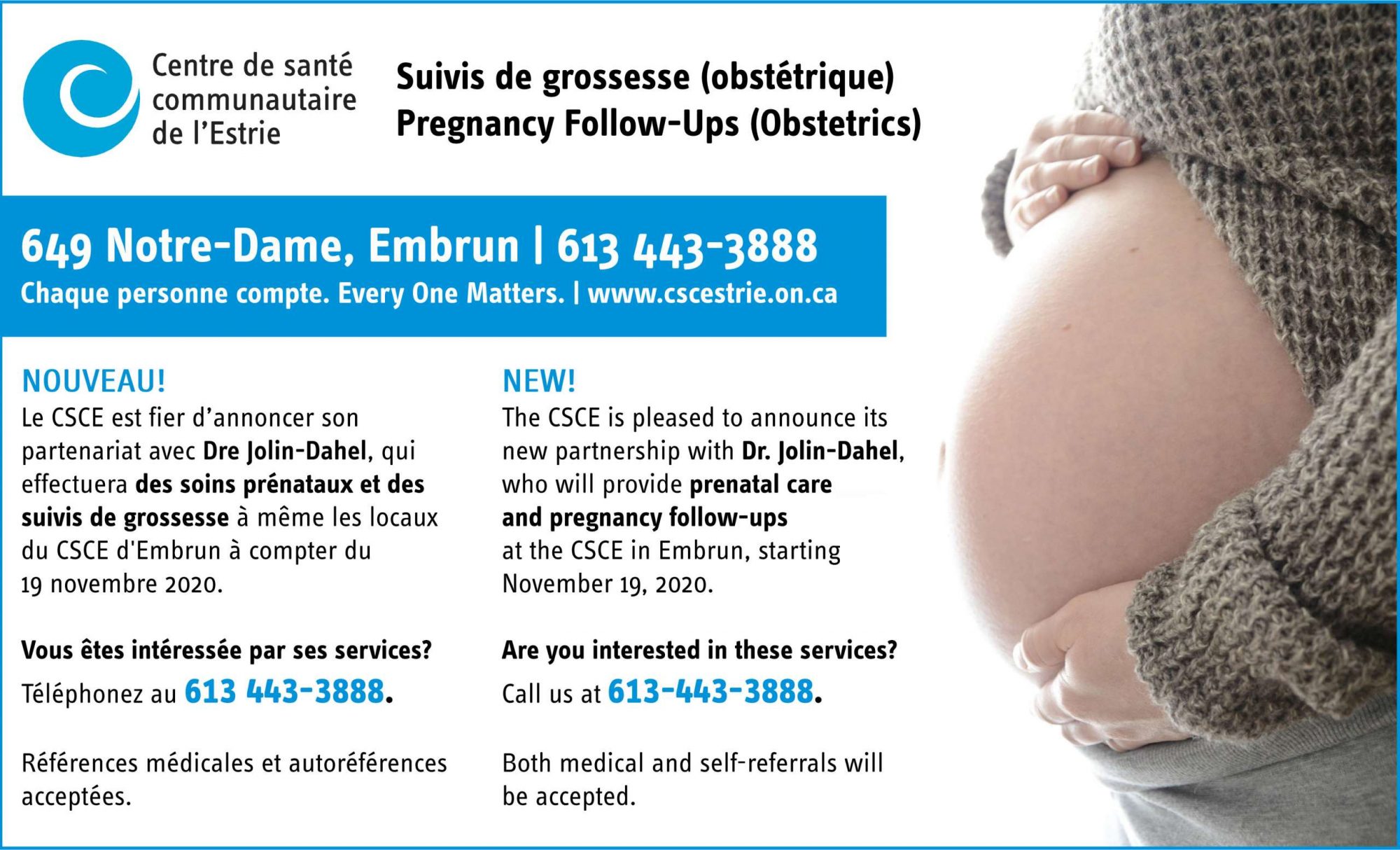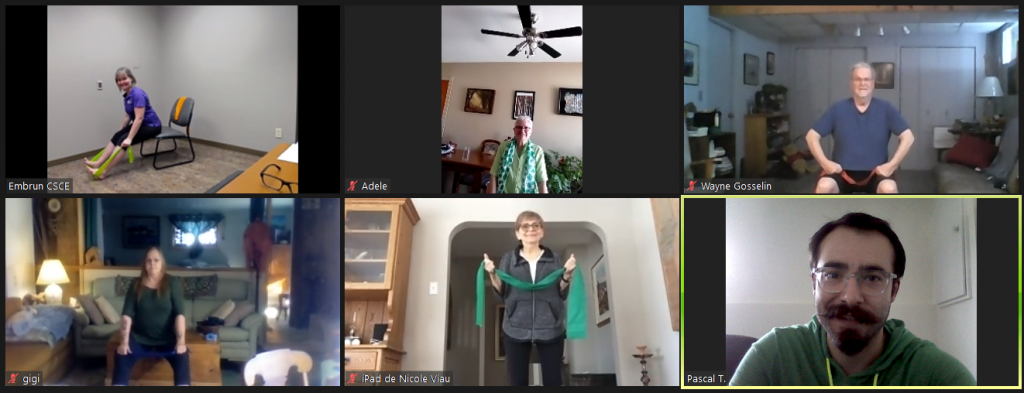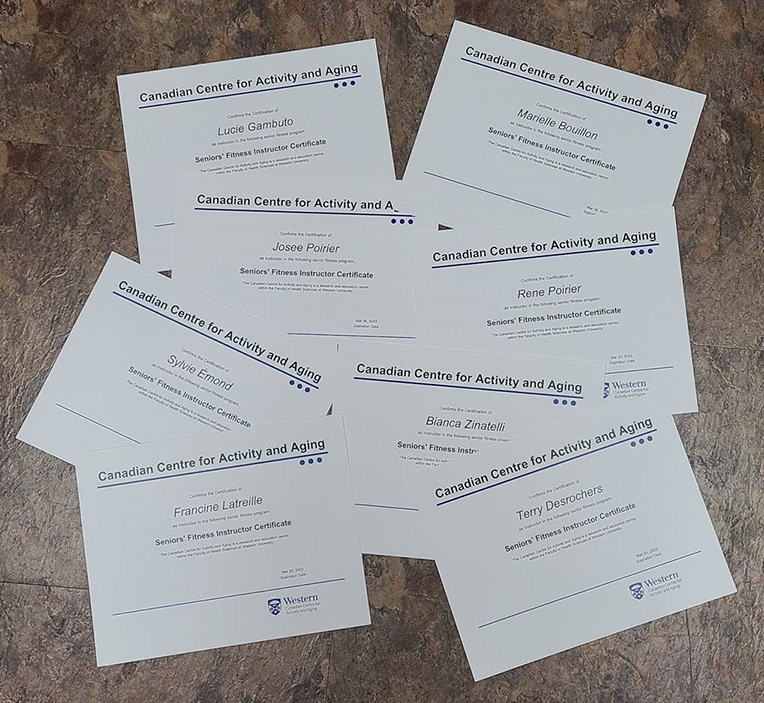Courtesy Call Program, Resources and Support
Courtesy Call Program
To provide support during these challenging times, our community healthcare team has launched a courtesy call program for clients and participants in various CSCE programs.
Courtesy calls are short telephone conversations that are meant to provide one-on-one personalized support, reduce isolation and raise awareness of the realities of COVID-19 (preventive measures, vaccination, misinformation, fraud, etc.). A CSCE counsellor listens and guides the client to the appropriate community resources and offers any support needed.
COVID-19—Resources and Support
In keeping with these courtesy calls, the CSCE has developed a guide with available resources and useful information about COVID-19.
A simplified version of this guide is available on the CSCE’s “COVID-19—Resources and Support” web page:
www.cscestrie.on.ca/en/COVID-19/.
It contains information on local organizations and several community initiatives in the areas of physical and mental health, wellness, food and financial assistance, vaccination, etc.
 CSCE Annual Report 2020-2021
CSCE Annual Report 2020-2021
Did you know that the CSCE has been offering online exercise groups since the pandemic first started? The virtual groups for people 55 and over “Get moving, for better balance!” are designed to keep you active, improve your strength and balance, and to help you socialize in the comfort of your own home.
Since October 2020, this free program has allowed our health promoters to offer more than 225 sessions in 17 weekly groups of about 10 participants each.
Participants have reported high satisfaction from their virtual experience. In addition, the fact that the sessions are led by a team of two facilitators ensures that they are always well supervised while performing their movements.
“I enjoy the continuity of the exercise program and I really like the camaraderie of our meetings. It’s a good alternative in today’s environment. I like the format and I think it’s very safe. Kudos and thanks to the leaders!” [translation]—From a participant in the virtual exercise group
It should be noted that these groups help break isolation and improve the physical condition of participants, in addition to helping to prevent falls and improve health.
Consult the CSCE web calendar to learn more about our exercise groups.
 CSCE Annual Report 2020-2021
CSCE Annual Report 2020-2021
Managing the COVID-19 pandemic has had a profound impact on our most vulnerable clients. This is why home care is more critical than ever to the well-being of vulnerable individuals who are unable to travel to receive medical care or whose visit to a CSCE site poses an increased health risk due to their medical condition. It is for this reason that existing home care services at the Cornwall site have been enhanced. It should be noted that these services are part of the vision for the integrated, connected, client-centred healthcare, and contribute to reducing the strain on hospital services.
The restrictions with respect to sanitary measures have burdened family caregivers who could not accompany their loved ones to the hospital or who feared that they would need to go alone. Home care services have helped alleviate isolation that has been a significant barrier for some of our clients and their families. In addition, it is difficult to contemplate death without being surrounded by our loved ones. As a result, we have found that some clients and their families have chosen, whenever possible, to have end-of-life care at home rather than in a hospice or hospital, where few visitors are allowed.
Implementing Palliative Home Care Services

The pandemic has also highlighted the importance of initiating the palliative care approach early in our clients’ disease journey to help keep them comfortable in their homes and to avoid hospitalization and isolation. The early palliative care approach prevents and relieves pain, alleviates other uncomfortable physical symptoms and provides psychological, social, cultural and spiritual support to clients and their caregivers throughout the course of the illness.
The goal of the palliative care approach is to provide the best possible quality of life and support for patients and their families. The circle of care is comprised of a palliative care physician, family physician or nurse practitioner, nurses, beneficiary attendants, a social worker, family caregivers, etc. This team works together to ensure that the patient is comfortable, maintains their dignity until the end of their life and has the most peaceful death possible.
The assistance of the Cornwall Hospice’s palliative care physicians is invaluable in keeping our clients as comfortable as possible in their homes and surrounded by their loved ones. The CSCE staff follows the recommendations of palliative care physicians to ensure the well-being of our clients. The availability of the Cornwall Hospice team allows us to meet the needs of our clients on short notice through home visits and telephone follow-ups. The Cornwall Hospice team is also very helpful in referring clients to community resources that best meet their needs, whether psychological, social or spiritual.
It should also be noted that reduced accessibility to home care services for nursing and personal care provided by the Local Health Integration Network (LHIN) has been another factor in the Cornwall site becoming more involved in home care for its clients.
The Story of a Young Parent with Cancer
This is the story of a person in their mid-thirties who has been receiving palliative care for over three years and for whom we are providing home care services in partnership with the Cornwall Hospice medical specialist, a CSCE family physician, a CSCE nurse, the oncology team, LHIN personal and home care specialists, and family caregivers.
I was diagnosed with cancer three years ago and am now in my fourth cycle of chemotherapy. As a single parent of a 10-year-old child, I have to continue to provide for him during my treatments, despite the strong side effects which often keep me in bed. With the help of the entire care team, I am able to stay home and the side effects of chemotherapy are better controlled.
It is not easy for a young single parent to contemplate death. That’s why the team around me not only helps me manage the pain and uncomfortable physical effects, but also addresses my psychological, social and spiritual concerns. In this way, I prepare my child and myself for the possibility of death sooner than expected. With the help of the palliative care physician and the resources of the Cornwall Hospice, I can say that. I have found some peace of mind. Now, I am more at peace and relieved that I am not leaving a burden on my family’s shoulders.
My family physician at the CSCE continues to follow me and to visit me at home, as needed. My family physician works with the palliative care physician and the entire care team to enhance my comfort on all levels. The CSCE nurse acts as a liaison between all members of the care team. She visits me at home and calls me often to make sure everything is okay. I feel at ease with her.
I am afraid of becoming infected with COVID-19. Having reduced access to services during the pandemic is also a big challenge for me. For example, I have to home school my child for fear that he will catch the virus and pass it on to me.
Having the care team come to my home makes me feel safer and more comfortable during the pandemic. Each professional is using the necessary precautionary measures and protective equipment. I have good support and feel at peace because I don’t have to schedule my appointments. I really appreciate not having to find a babysitter or transportation to receive care.
Because I have had very little interaction with family and friends since the pandemic began, I can say that home visits and telephone follow-ups help me feel less isolated. I feel supported on all levels. I know that I can easily get help from the Cornwall Hospice, the CSCE and the home care team if needed. I appreciate every action and intervention that allows me to continue to live at home comfortably. I am very grateful! [translation]
 CSCE Annual Report 2020-2021
CSCE Annual Report 2020-2021
“I would like to thank the CSCE for the excellent service I received during the pandemic. I feel privileged to be a client of the CSCE. Telehealth and virtual groups are a real breakthrough not only for the CSCE but also for us as clients, who are fortunate to benefit from these services. Kudos!” [translation]
In the context of a pandemic, when we must limit physical contact, the CSCE is helping to reduce the risk of transmission by developing safe and effective tools to continue offering quality care and services.
Over the past year, the CSCE has made a technological shift and turned to virtual technology. The CSCE now hosts several online groups, including exercise courses and mental health groups.
Moreover, appointments for medical, nutritional and mental health services can now be made safely using a cell phone, tablet or computer. Talk to your healthcare provider to see if this is the right solution for you.
 New – Appointment Reminders by Email, Text Message (SMS) or Voice
New – Appointment Reminders by Email, Text Message (SMS) or Voice
The Centre de santé communautaire de l’Estrie (CSCE) now offers automated appointment reminders via email, SMS or voice.
This service improves office efficiency, reduces missed appointments and increases scheduling capacity for clients who require timely health care services.
Naturally, clients may choose to unsubscribe from this service at any time.
To get a glimpse of this new service, watch the following video:
https://youtu.be/JHy83c8KylM
 CSCE Annual Report 2020-2021
CSCE Annual Report 2020-2021
The CSCE is proud to have participated in the October 2020 and March 2021 Emergency Food Basket Distribution Campaign. This initiative, organized by the Social Development Council of Cornwall and Area, United Way SDG and members of the Regional Emergency Response Council, allowed many individuals, couples and families in Stormont, Dundas, Glengarry and Cornwall to receive an emergency food basket during these difficult times.
In short, the initiative:
- involved over 40 organizations and community partners;
- included more than 150 volunteers assigned to packing and/or delivery;
- allowed for 1,550 baskets to be distributed in October 2020;
- allowed for 1,656 baskets to be distributed in March 2021.
Some pictures of the event:



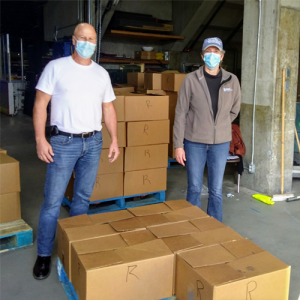
 CSCE Annual Report 2020-2021
CSCE Annual Report 2020-2021
Diabetes Education Program
As a result of the pandemic, the year 2020-21 has brought significant changes to the Diabetes Education Program (DEP). Despite the circumstances, when the Ontario government first announced the lockdown, DEP educators went to work to continue to provide diabetes education and management services.
Such a program is essential for diabetic and pre-diabetic clients. It provides comprehensive education on the use of insulin, treatment options, diabetes self-management and prevention of complications, and assists physicians and nurse practitioners in developing a treatment plan tailored to the client’s reality, needs and blood work.
An Essential Service for Diabetic and Pre-Diabetic Clients

Unfortunately, diabetes does not take a break, no matter what the context. Knowing also that stress can have a significant impact on diabetes, one can only imagine the impact of interrupting services during the pandemic. There is no question that this program needed to be maintained.
The DEP team members rallied and changed their working methods to offer services by phone or video conference. This virtual approach has the advantage of ensuring everyone’s protection, both clients, who can thus avail themselves of services in the safety of their own homes, and educators. Of course, educators continue to offer face-to-face appointments when necessary, while ensuring that they wear appropriate protective gear.
Over the past year, we have seen the effectiveness of this approach. Thanks to the sustained efforts of the DEP team, the safety of our clients and staff is maintained, transmission of COVID-19 can be prevented and access to services is facilitated, which is greatly appreciated by the community. This approach will likely continue well beyond the pandemic.
Learn more about the Diabetes Education Program
 CSCE Annual Report 2020-2021
CSCE Annual Report 2020-2021
The CSCE is proud to be able to count on its volunteers and would like to sincerely thank each of them. Initiatives like exercise groups, immunization clinics, the Green Food Box and Chronic Conditions Self Management workshops, just to name a few, would not exist without the precious support of our volunteers. Clients and staff of the CSCE are most grateful for their talents, time and energy. Thank you for all your help!
We encourage you to apply to become a volunteer! Click here for more information.
“Senior Fitness Instructor”
In particular, we would like to congratulate a group of eight volunteers who have worked incredibly hard over the past few months to become certified as Senior Fitness Instructors.
With this certification, they will be able to lead in-person exercise groups for clients aged 55 and over at various locations throughout our territory.
We look forward to when we can safely gather again and see these amazing volunteers in action!
 CSCE Annual Report 2020-2021
CSCE Annual Report 2020-2021
Despite changes in clinical appointment scheduling since the beginning of the pandemic, CSCE dietitians are continuing to provide one-on-one appointments with clients, answering their questions and helping them make lifestyle changes and improve their health. While they are continuing to offer appointments by phone and in person as needed, as the months go by, they are finding that their clients are becoming more and more comfortable with virtual delivery. This allows for a secure conversation with clients and involves fewer steps than in the past. Over time, a relationship of trust develops, and the dietitian accompanies and supports the client in their desire to make lifestyle changes.
Groups have also grown over the past year, and as a result of virtual delivery, information workshops on the introduction of solids and toddler nutrition are currently being offered in cooperation with the Rockland Family Centre. Le plaisir de manger [available in French], a culinary workshop for young children, is now also available online. In addition, the nutrition program team continues to adapt and respond to the needs of the community by developing ad hoc presentations for various audiences.
Understanding Why We Eat With the “Craving Change” Program
The “Craving Change” certified program is newly offered online by two CSCE dietitians. Its objective is to help understand “why we eat” and improve our relationship with food. As this pilot project was successful, other sessions are now being developed and will eventually be offered at all CSCE sites.
Professional Dietitians: A Trusted Source for Nutritional Information

Each month, dietitians take turns writing an article for the online magazine Vivre + [available in French] by the Fédération des aînés et des retraités francophones de l’Ontario (FARFO). The CSCE is very proud of this partnership, which highlights various themes related to nutrition.
Because CSCE dietitians operate in a field that is constantly evolving, they have tricks of their own and share reliable information based on scientific data with the community. It should be noted that no referral is required and that you do not need to be a client of the CSCE to refer to the services of a dietitian.
Feel free to contact the CSCE nearest you to book an appointment! Click here for more information.
 CSCE Annual Report 2020-2021
CSCE Annual Report 2020-2021
On December 2nd, the employees at the Centre de santé communautaire de l’Estrie (CSCE) held their annual auction via an online platform. This fundraising event, which is important to our clients especially during these difficult times, raised a whopping $14,415 helping more than 170 families.
For the past 15 years now, the employees at the CSCE have held this annual auction to raise funds for clients who face financial difficulties. The money raised is used to buy gift cards, which are distributed to many people and families residing within our communities. We are so pleased that this initiative can bring some solace to those in need during the holidays throughout the counties of Stormont, Dundas, Glengarry, Prescott and Russell.
Congratulations and thank you to all those who made this event a huge success!
Every One Matters.
Pictures of the event

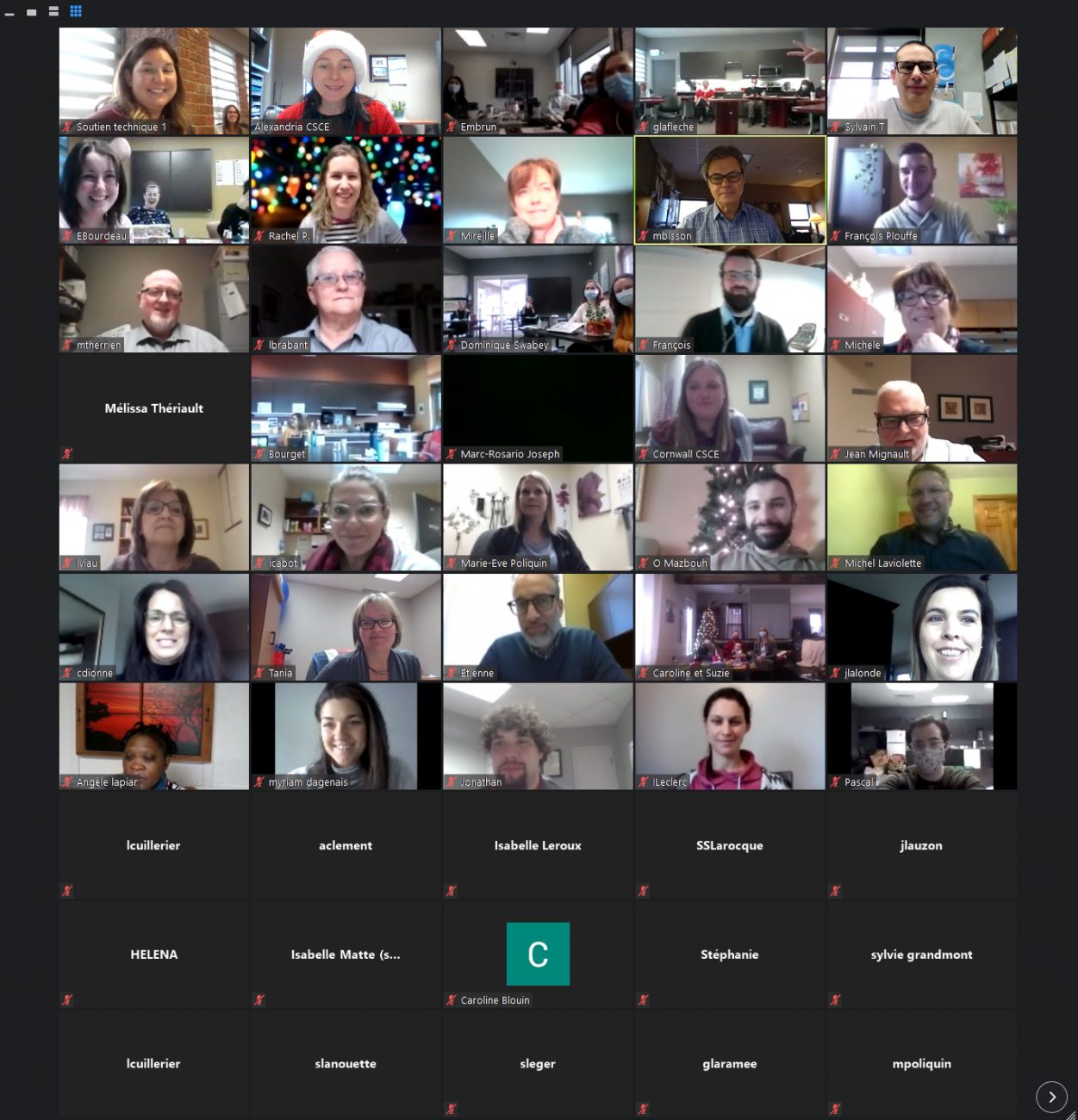
 CSCE Annual Report 2020-2021
CSCE Annual Report 2020-2021
November 9, 2020 – The Centre de santé communautaire de l’Estrie (CSCE) in Embrun is pleased to announce its partnership with Dr. Kheïra Jolin-Dahel, Family Physician specializing in obstetrics that also offers maternal care and performs deliveries at the Winchester District Memorial Hospital. She will provide bilingual services at the CSCE in Embrun (649 Notre-Dame Street).
Originally from Montreal, Dr. Jolin-Dahel is passionate about women’s health. She graduated in Medicine from the University of Ottawa in 2013. Starting November 19, 2020, she will provide prenatal care and pregnancy follow-ups every Thursday at the CSCE in Embrun.
Women interested in receiving these services are invited to call 613 443-3888.
Both medical and self-referrals are accepted.
Information:
Centre de santé communautaire de l’Estrie, Embrun
613 443-3888
